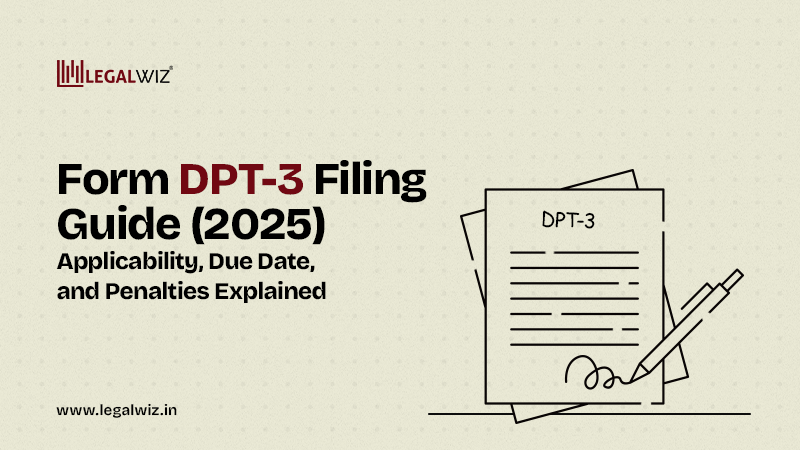Form DPT-3 Filing Guide (2025): Applicability, Due Date, and Penalties Explained
If your company has accepted any loans or advances, even from directors, shareholders, or related parties, then DPT-3 might apply to you. Filing this form is not just a compliance formality; it’s a mandate under the Companies Act, 2013. Missing the deadline can lead to serious penalties and compliance red flags.
Let’s break down everything you need to know about Form DPT-3, including its purpose, applicability, types, filing process, and penalty provisions.
What is Form DPT-3?
Form DPT-3 is a statutory return that companies (other than government companies) must file with the Ministry of Corporate Affairs (MCA) to report any outstanding amounts of money or loans that are not treated as deposits under the Companies Act, 2013.
This requirement was introduced through an MCA notification dated 22nd January 2019, which amended the Companies (Acceptance of Deposits) Rules, 2014 by inserting sub-rule (3) in Rule 16A.
According to this amendment:
Every company, other than a government company, shall file a one-time return of outstanding receipts of money or loans that is not considered as a deposit for the period from 1st April 2014 to 31st March 2019 in Form DPT-3 within 90 days from 31st March 2019.”
Later, through General Circular No. 05/2019, the MCA extended the deadline and clarified that additional fees would be levied only after 30 days from the date of the form’s deployment on the MCA portal. As a result, the revised due date became 31st May 2019.
Since then, Form DPT-3 is required to be filed annually by all companies that have any outstanding non-deposit receipts.
Eligible Companies for Form DPT-3 Filing
The requirement to file Form DPT-3 applies to a wide range of companies registered in India. If your company has any outstanding receipts or loans not classified as deposits, it is likely required to file this return annually.
- Private Limited Companies
- One Person Companies (OPCs)
- Public Limited Companies
- Section 8 Companies (Non-profit organizations)
Who is Exempt from Filing Form DPT-3?
Not every company needs to file Form DPT-3. The following are exempted from this requirement:
- Government Companies
- Non-Banking Financial Companies (NBFCs)
- Housing Finance Companies registered with the National Housing Bank
- Any other company notified under the proviso to Section 73(1) of the Companies Act, 2013
Transactions Not Considered as Deposits
Here’s a list of amounts not treated as deposits under Rule 2(1)(c) of the Companies Rules, 2014:
- Funds received from the Central or State Government, or those guaranteed by them
- Borrowings from public financial institutions, insurance companies, or banks
- Loans received from another company
- Subscription to securities (including share application money or call-in-advance)
- Loans from directors or, in case of a private company, relatives of directors, if they held the position at the time of lending
- Security deposits received from employees, not exceeding the employee’s annual salary, as per the employment contract
- Advance received in the ordinary course of business (e.g. for supply of goods, services, or performance of contract obligations)
- Amount up to ₹25 lakhs or more received by a startup through a convertible note, in a single tranche
- Money raised by issuing secured bonds or debentures (with first charge) or non-convertible debentures without a charge on assets
- Unsecured loans from promoters
- Money received from a Nidhi Company or via chit fund subscriptions under the Chit Funds Act, 1982
- Amounts raised from SEBI-registered schemes like mutual funds, AIFs, or collective investment schemes
- Any other receipt that is specifically excluded from deposits under Rule 2(1)(c)
Even though these are not treated as deposits, if they are outstanding as of 31st March, they must be disclosed in Form DPT-3.
Form DPT-3 Due Date
The due date for filing Form DPT-3 is 30th June every year. This applies to all companies that are required to report their outstanding receipts of money or loans not treated as deposits for the financial year ending 31st March.
Documents Required for Filing Form DPT-3
To successfully file Form DPT-3, companies must prepare and attach certain documents based on the nature of the transaction. Here’s a list of commonly required documents:
- Auditor’s Certificate
- Deposit Insurance Contract
- Copy of Trust Deed
- Copy of instrument Creating Charge
- List of Depositors
- Details of Liquid Assets
- Outstanding Receipts of Money or Loans
Fees for Filing Form DPT-3
The filing fees for Form DPT-3 are determined as per the Companies (Registration Offices and Fees) Rules
Normal Filing Fee
In case of company having share capital:
| SNo. | Nominal Share Capital (INR) | Fee Applicable (INR) |
| 1 | Less than 1,00,000 | 200 |
| 2 | 1,00,000 to 4,99,999 | 300 |
| 3 | 5,00,000 to 24,99,999 | 400 |
| 4 | 25,00,000 to 99,99,999 | 500 |
| 5 | 1,00,00,000 or more | 600 |
In case of company not having share capital:
| Normal Fee Applicable (INR) |
| 200 |
Additional Fees in Case of Delay in Filing Web Forms
| S No. | Period of Delay | Additional Fee Applicable (INR) |
| 1 | Up to 30 days | 2 times of normal filing fees |
| 2 | More than 30 days and up to 60 days | 4 times of normal filing fees |
| 3 | More than 60 days and up to 90 days | 6 times of normal filing fees |
| 4 | More than 90 days and up to 180 days | 10 times of normal filing fees |
| 5 | More than 180 days | 12 times of normal filing fees |
Penalties for Non-Filing of Form DPT-3
Missing the Form DPT-3 filing deadline can lead to strict penalties under the Companies Act, 2013. Here’s what non-compliance can cost:
For the Company
- Penalty of ₹1 crore or twice the amount of the deposit, whichever is lower
- Maximum penalty can go up to ₹10 crore
For Responsible Officers
- Imprisonment up to 7 years
- Fine between ₹25 lakhs to ₹2 crore
For Delay in Paying Penalty
- Initial fine of ₹5,000
- Additional ₹500 per day until the penalty is paid
How to File Form DPT-3?
Form DPT-3 is a web-based form filed online through the official Ministry of Corporate Affairs (MCA) portal. Here’s a simplified overview of the process:
- Log in to the MCA Portal
- Visit www.mca.gov.in and log in using your Business User credentials.
- Visit www.mca.gov.in and log in using your Business User credentials.
- Access the DPT-3 Webform
- Navigate to MCA Services > e-Filing > Deposit Related Filings > DPT-3 Webform.
- Navigate to MCA Services > e-Filing > Deposit Related Filings > DPT-3 Webform.
- Fill in Required Details, such as
- CIN and Email ID
- Company’s main objects
- Net Worth
- Outstanding amounts as of 31st March
- Particulars of any charges or credit ratings
- Attach Supporting Documents
- Including the auditor’s certificate, board resolution, and financial data as required.
- Including the auditor’s certificate, board resolution, and financial data as required.
- Authenticate Using DSC
- Affix your Digital Signature Certificate for authorization.
- Affix your Digital Signature Certificate for authorization.
- Pay Applicable Filing Fees
- Based on your company’s authorized share capital.
- Based on your company’s authorized share capital.
- Receive SRN & Email Acknowledgement
- Once submitted, you’ll get a Service Request Number (SRN) and email confirmation from the Registrar of Companies.
How LegalWiz.in Helps You Stay Compliant
Whether your company has formal deposits or exempted loans, DPT-3 filing can be complex if you’re not well-versed with MCA rules. At LegalWiz.in, we make it effortless:
- We verify if DPT-3 is applicable to your company
- Help you identify the correct category for reporting (deposit vs. exempted)
- Ensure accurate documentation and classification of all financial transactions
- Coordinate with auditors (if required) for certifications
- Prepare, digitally sign, and file your DPT-3 with MCA before the deadline
- Share the SRN and acknowledgment for your records
- Provide ongoing compliance support, including timely reminders and updates
From consultation to submission, our experts take care of the entire process, so you can stay focused on growing your business, not navigating regulations.
Final Thoughts: Don’t Let Compliance Slip Through the Cracks
Form DPT-3 is more than just another MCA requirement—it’s a legal obligation tied directly to your company’s financial transparency and regulatory health. Even if your company hasn’t accepted formal deposits, outstanding loans or advances from directors, shareholders, or other exempt sources still need to be reported.
Failing to file Form DPT-3 on time can result in:
- Heavy financial penalties—up to ₹10 crore for companies
- Disqualification risks for directors
- Red flags during audits, funding, or due diligence
- Daily late fees that compound quickly
Yet, most companies delay because the rules are technical, the portal is confusing, or they’re unsure about applicability.
That’s where LegalWiz.in steps in.
We make the entire process clear, compliant, and fast. Whether you’re a startup or an established company, we’ll guide you every step of the way—from determining applicability to getting your form filed with zero hassle.
The deadline is 30th June 2025—don’t wait until the last moment.
File Form DPT-3 with LegalWiz.in now and stay penalty-free.

Amisha Shah
Amisha Shah heads content at LegalWiz.in, where she transforms complex legal concepts into clear, actionable insights. With extensive experience in legal, fintech, and business services, she helps startups and enterprises navigate regulatory challenges through engaging, accurate content that empowers informed business decisions.







